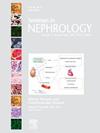COVID 与肾脏:最新进展。
IF 2.8
3区 医学
Q2 UROLOGY & NEPHROLOGY
引用次数: 0
摘要
由严重急性呼吸系统综合征冠状病毒 2 引起的冠状病毒病-2019(COVID-19)已导致全球大流行,并继续给全世界人民带来健康问题。肾移植受者和透析患者等免疫力低下的人群一直是受影响最严重的人群之一,他们感染后的治疗效果较差,对 COVID-19 疫苗的反应减弱,感染时间延长。大流行对患有慢性肾脏疾病 (CKD) 的患者也有很大影响,CKD 会增加对 COVID-19 的易感性、入院风险和死亡率。事实证明,COVID-19 还可通过直接和间接机制导致急性肾损伤 (AKI)。随着疫情的发展,COVID-19 急性肾损伤的发生率在下降,但仍与急性肾损伤严重程度相关的不良患者预后有关。此外,越来越多的证据显示,COVID-19 对肾脏的长期影响表明,感染数月后肾功能仍在下降。本综述总结了目前研究 COVID-19 对肾脏影响的证据,包括对 CKD 患者(包括接受肾脏替代治疗的患者)的影响,以及对 COVID-19 AKI 的讨论。本文章由计算机程序翻译,如有差异,请以英文原文为准。
COVID and the Kidney: An Update
Coronavirus disease-2019 (COVID-19), caused by severe acute respiratory syndrome coronavirus 2, has led to a global pandemic that continues to be responsible for ongoing health issues for people worldwide. Immunocompromised individuals such as kidney transplant recipients and dialysis patients have been and continue to be among the most affected, with poorer outcomes after infection, impaired response to COVID-19 vaccines, and protracted infection. The pandemic also has had a significant impact on patients with underlying chronic kidney disease (CKD), with CKD increasing susceptibility to COVID-19, risk of hospital admission, and mortality. COVID-19 also has been shown to lead to acute kidney injury (AKI) through both direct and indirect mechanisms. The incidence of COVID-19 AKI has been decreasing as the pandemic has evolved, but continues to be associated with adverse patient outcomes correlating with the severity of AKI. There is also increasing evidence examining the longer-term effect of COVID-19 on the kidney demonstrating continued decline in kidney function several months after infection. This review summarizes the current evidence examining the impact of COVID-19 on the kidney, covering both the impact on patients with CKD, including patients receiving kidney replacement therapy, in addition to discussing COVID-19 AKI.
求助全文
通过发布文献求助,成功后即可免费获取论文全文。
去求助
来源期刊

Seminars in nephrology
医学-泌尿学与肾脏学
CiteScore
5.60
自引率
0.00%
发文量
27
审稿时长
6-12 weeks
期刊介绍:
Seminars in Nephrology is a timely source for the publication of new concepts and research findings relevant to the clinical practice of nephrology. Each issue is an organized compendium of practical information that serves as a lasting reference for nephrologists, internists and physicians in training.
 求助内容:
求助内容: 应助结果提醒方式:
应助结果提醒方式:


